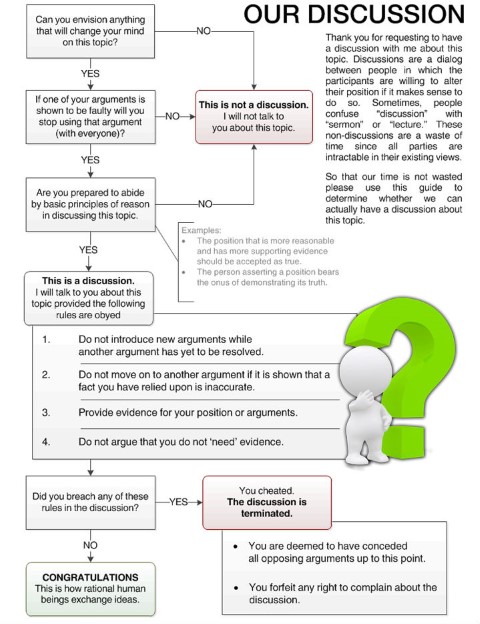-
Home / Stupid questions and how to make them better
Was this valuable to you?
other links and editorials from b_independent
It is said that there's no such thing as a stupid question. While some of us will beg to differ (e.g., how many times do people ask questions they already know the answers to, and not in the rhetorical sense?), there are certainly characteristics of a question that make them more effective.
The purpose of a question is to gain knowledge for some end. Processes like the Socratic method help you become less passive in your thinking and more able to substantiate your own beliefs. But you still have to ask the proper questions. Ironically, with the benefits of search technologies like Google that help us find better answers, it almost seems that we are becoming lazy in our questioning skills.
Add to this dynamic that we often don't even consider certain questions until prompted by others. For example, unless you've taken a philosophy class, read books on philosophy, or have friends who are intellectuals, you likely haven't given much thought to questions pertaining to philosophical questions. It is only when specifically asked about it that you reflect on your own thoughts and realize you might have limited knowledge or experience to consider such questions.
"Good" questions are said to have four, primary characteristics: clarity of purpose, proper framing, sincerity of intent, and respectfulness. Before you ask questions, do you ever consider those characteristics? Is the structure of your question and the hierarchy of the knowledge you're trying to acquire important to getting at better answers? Do you ask many questions, or do you typically accept what you are told? Do you think there is such thing as a dumb question? Is the following hierarchy useful to generally understand a subject (level 1), to fit the general knowledge into your existing framework (level 2), and to take your knowledge to new levels (level 3)?
Level One
1. Definitions and clarifications How do you define this (word, term, idea, etc.)? What does this idea (passage, concept, etc.) mean? What would be a specific, concrete example of this?
2. Contextuals How was this idea (event, text, work, etc.) shaped by its time? Where did this originate and why? Who was the originator of this and what was he or she like?
3. Analyzers What parts or features make up the whole and what does each part do? How do the parts contribute to the whole? How is this organized and why is it organized this way? What are the most important features of this?
Level Two
4. Comparatives How is this the same as that? How is this different than that? How are these more or less similar? What is the opposite of this?
5. Causals What factors caused this to happen? Which of these factors is sufficient? Which contributing? Which probable? On what grounds can we eliminate possible causes or explanations?
8. Evaluatives Why do you like or dislike this (or agree or disagree with this)? How strong is the case that this is correct? What criteria are best for judging this? What is the best order or priority for these things and why? What is the strongest argument against this?
Level Three
7. Counterfactuals How would this change if X happened? How would things be different if X had not happened? How would things be different if X happened to a greater (or lesser) degree?
8. Extenders (Synthesizers) How can we apply this to this set of circumstances? What can we predict because of this? What ideas can be added to this? What might happen if you added this to that?
About philosophy
 philosophyhttps://valme.io/c/philosophyc_prompt
philosophyhttps://valme.io/c/philosophyc_prompt“Too often... we enjoy the comfort of opinion without the discomfort of thought," said John F. Kennedy in 1962.
The term philosophy comes from two Greek words meaning love of wisdom. Well put. Please apply it here.



I doubt I'd ever go through such rigor to ask a question, but it's an interesting framework to organize how to approach a problem.